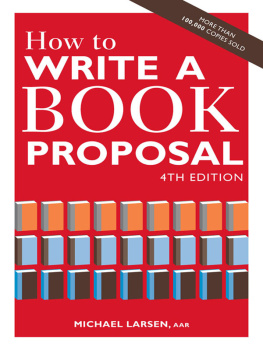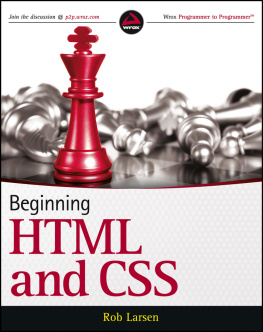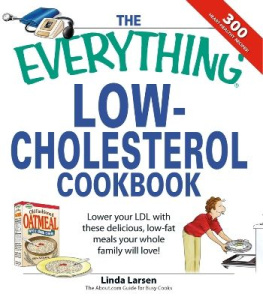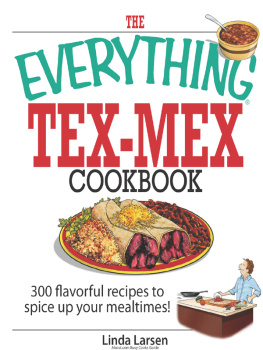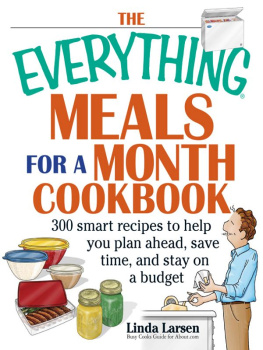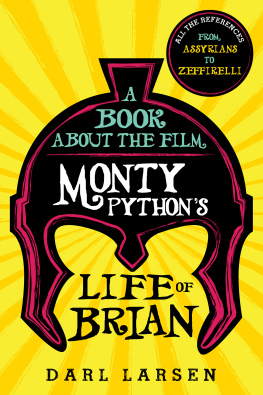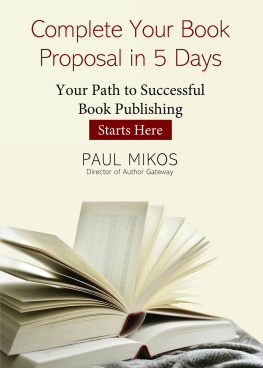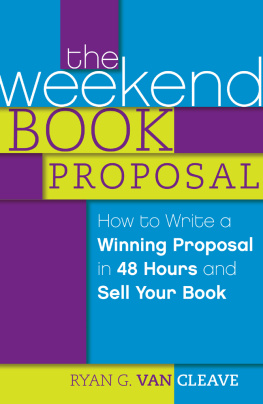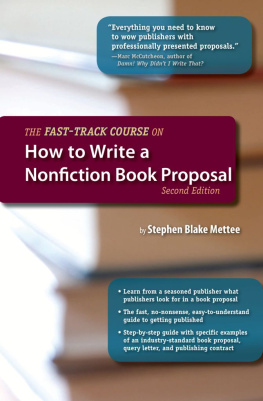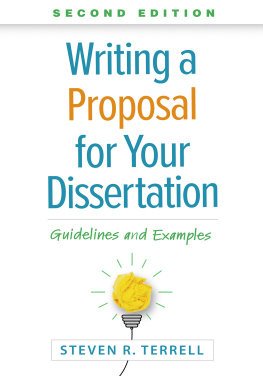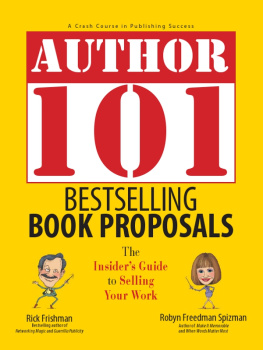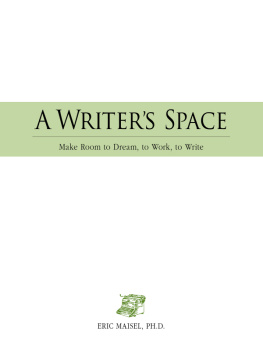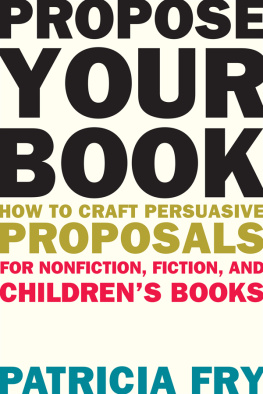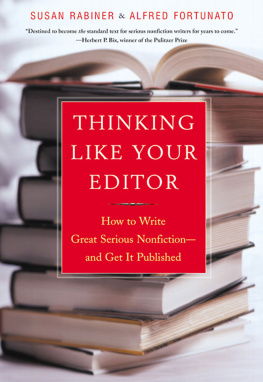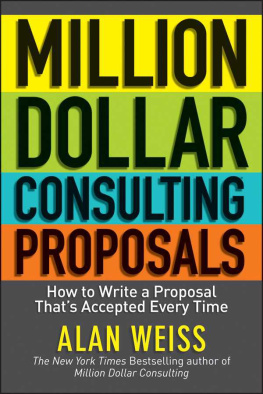How to
WRITE A
BOOK
PROPOSAL
4TH EDITION

MICHAEL LARSEN, AAR
HOW TO WRITE A BOOK PROPOSAL, 4TH EDITION. Copyright 2011 by Michael Larsen. Manufactured in the United States of America. All rights reserved. No other part of this book may be reproduced in any form or by any electronic or mechanical means including information storage and retrieval systems without permission in writing from the publisher, except by a reviewer, who may quote brief passages in a review. Published by Writer's Digest Books, an imprint of F+W Media, Inc., 4700 East Galbraith Road, Cincinnati, Ohio 45236. (800) 289-0963. Revised edition.
For more resources for writers, visit www.writersdigest.com/books.
To receive a free weekly e-mail newsletter delivering tips and updates about writing and about Writer's Digest products, register directly at WritersDigest.com/getnewsletter
eISBN 13: 978-1-5829-7703-4
This ebook edition: April 2012

Edited by: Melissa Wuske
Print edition designed by: Claudean Wheeler
Production coordinated by: Debbie Thomas
ACKNOWLEDGMENTS
FOR THE FOURTH EDITION
To all the writers, editors, and publishing professionals from which I've learned, my thanks for helping to provide the knowledge between these covers. My great, lasting thanks go to:
- our clients, from whom we continue to learn.
- Claire Kavanaugh, for her great eye.
- Stephanie Chandler, for her help and knowledge about marketing and technology.
- Jacob Morgan, for his advice about online marketing.
- David Marshall, for his knowledge of technology.
- my editor, Melissa Wuske, for her help and encouragement.
- the rest of the staff at Writer's Digest who worked on the book.
- Kelly Nickell, Jane Friedman, and Chuck Sambuchino extra thanks for your support.
- Adele Horwitz and Antonia Anderson, for their comments on the manuscript.
- Kathryn Wayne, for helping with the appendix on competitive books.
- Kathryn's husband, Gary Nelson, for all he did to help a house become a home.
- agents Rita Rosenkranz, who read the manuscript, and Robert Shepard, who read part of it, despite moving to Los Angeles extra, tremendous thanks for your time and insights.
- our authors for letting me add their work for this addition: Ted Allrich, Kathleen Archambeau, Kirk Boyd, Jane Flaherty, Catherine Friend, the late Shivani Goodman, Allan Hamilton, Lawrence Knowles, Jay Conrad Levinson, Adam Najberg, David Perry, Kevin Reifler, Peter Stark, and Nick Vacca.
- Laurie McLean, our agenting colleague, for her passion, intelligence, creativity, marketing savvy, and joie de vivre.
- Denny and Diana Nolan, for their friendship and hospitality.
- my brother Ray, a tower of strength, and his wife, Mary Ann, for their help in keeping a roof over the agency.
- Elizabeth, for all that she is and does.
To one and all, my gratitude!
PART I:
WHY THE BOOK? WHY YOU?
CHAPTER 1
Why Now Is the Best Time Ever to Write Books:Twenty Reasons for You to Be a Writer
Now is the most amazing time ever to be alive and the best time ever to be a writer. If luck is ability meeting opportunity, you are one of the luckiest writers who ever lived. Here's why you should commit your life to being a writer:
- You are the most important person in the publishing process because you make it possible. If it weren't for writers, agents and publishers would have to do something else for a living.
- You have more options for getting your books published, some of which e-books, print-on-demand, podcasting, blogs, and websites cost little or nothing.
- You can publish or distribute your work as an e-book, podcast, or print-on-demand book for free or a small cost. If your book costs you nothing to write and publish, and only one person buys it, it's making money.
- There are more ways to profit from your books, including spin-off products, speaking, and subsidiary rights. Books in English, the international language of culture and commerce, and in translation are selling in more countries. E-book sales are an additional revenue stream, and with links to content on the Web that already exists or that you or your publisher create, they explode the potential for enriching how readers experience your book.
- You have more models books and authors to help guide your writing and your career. You don't have to figure out how to write a how-to book or build a career; you can use your favorite books and authors as models.
- There are more subjects for you to write about.
- You can sell your book by writing a proposal. A writer's first novel usually must be completed before she can sell it, but 90 percent of nonfiction is sold with proposals. These proposals usually contain just one chapter or 10 percent of the manuscript, information about the book, an outline, and how you'll promote the book and yourself.
- Finding an agent is easier. If you have a salable book, it's easy to acquire an agent and new agencies are springing up all the time.
- Selling your book yourself is easier. Most writers sell their books themselves without the help of agents. Chapter thirty-seven tells you how.
- If you come up with an idea for a series of books you are passionate about writing and promoting, you can create a career out of it. You can practice niche craft and build your career book by book.
MASTER OF NICHE CRAFT
Jay Conrad Levinson self-published a book called Earning Money Without a Job: The Economics of Freedom. I read a story about Jay in the San Francisco Chronicle, called him, and sold the book to Henry Holt. Then Jay wanted to write a book called Secrets for Making Big Profits From Your Small Business. But when I read his proposal, I saw the phrase guerrilla marketing, and I knew that had to be the title. Guerrilla Marketing is now in its fourth edition and has spawned more than forty spin-off books in what has become a virtually endless series. Jay is a master at practicing niche craft.
- You have more ways to test-market your books. You can maximize the value of your book before you sell it by test-marketing it. Chapter twenty-one tells you how.
- Writing is a forgiving art. You can write as many drafts as you need only the last one counts. As long as you have knowledgeable readers, and you learn from mistakes, writing salable books is inevitable.
- You can be an author without being a writer. The two assets authors have are a body of salable information and the ability to promote their work. They can work with an editor or collaborator or hire a ghostwriter.
- You can advance a cause or belief. A book can change hearts, minds, and the world.
- You have access to an amazing array of resources and some of them are free. Finding the books, magazines, events, classes, organizations, publishing professionals, online resources, information, and communities you need is easier and faster than ever.
- You will do a better job writing and promoting with each book you write. Think of your career as a lifetime endeavor with ten or twenty books in it, each better and more profitable than the previous one.
- Becoming a successful author is easier than becoming a successful actor, artist, dancer, composer, or musician. Writers have an easier, faster path to success than other kinds of artists. Only 1 percent of actors succeed;

